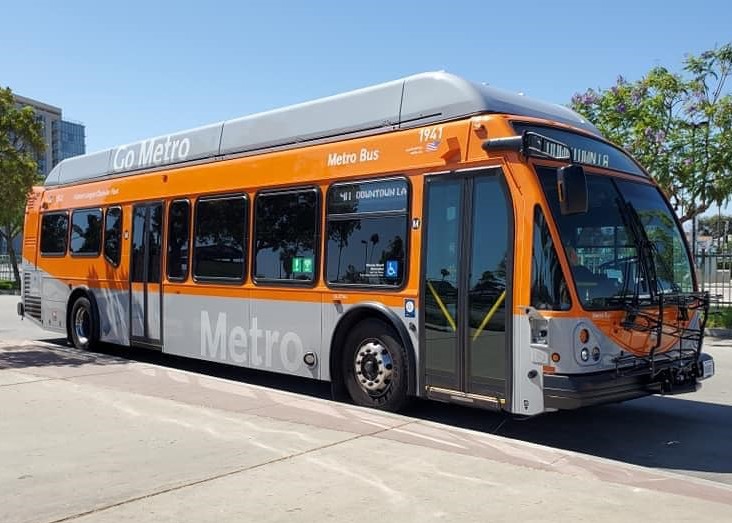After one bus caught fire, Metro temporarily removed approximately 180 new compressed natural gas (CNG) buses from service. Metro worked with the manufacturer to diagnose and resolve the issue, and the buses are expected to return to service soon.
As SBLA reported earlier, on July 29, an out-of-service bus caught fire in Metro's Cypress Park yard. The bus that caught fire was a fairly new CNG bus, manufactured by El Dorado National California (ENC). In 2019, Metro purchased 259 40-foot ENC buses for delivery starting this year.
A September memo noted that, due to the fire, Metro removed approximately 180 new ENC buses from service. The memo stated that "No bus runs have been cancelled due to lack of buses. Metro has extra buses that had recently been removed from service as the new ENC buses arrived, and these buses are being placed back into service to replace the ENC buses that were removed from service."
Metro attributed the fire to a faulty electrical panel, and noted that that ENC had been proactive in investigating and correcting the issue. Since the September memo, Metro spokesperson Dave Sotero noted that "The problem has been traced to quality and design problems with a Printed Circuit Board (PCB). The PCB has been redesigned and is undergoing thorough vetting. It has already undergone manufacture and bench testing." According to Sotero, ENC has already successfully tested the retooled PCB on Metro buses that have not yet been delivered. Sotero also reported that ENC and Metro are now testing the upgraded buses in "simulated revenue service" on 7-8 buses. "Following successful completion of all tests, the fix will be rolled out to the fleet."
The L.A. City Transportation Department (LADOT) also operates ENC buses. Responding to Streetsblog, LADOT spokesperson Colin Sweeney reported that there have been no fires on LADOT's ENC buses (147 DASH buses and 22 Cityride buses) and that ENC vehicles are performing satisfactorily.
(Streetsblog emailed ENC for additional information on the situation, but has not received a response at press time.)
These bus fleet issues come at a time when Metro ridership is returning and Metro is struggling to restore transit service to pre-COVID levels. The main problem Metro is facing is a shortage of operators to drive buses. Though Metro states that no bus runs were missed as a result of the fire, running older buses and having to test retooled ones may also be factors contributing to Metro riders' current experience of crowed, late, and unreliable buses.






